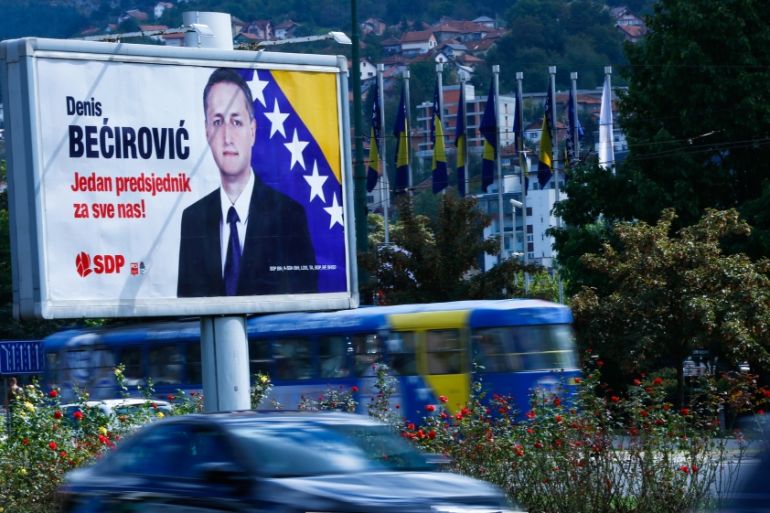Bosnians vote in elections amid increasing ethnic tensions
Almost 3.3 million people head to the polls in Bosnia’s parliamentary and presidential elections.

Polls have opened in Bosnia for a general election that could install a pro-Russian nationalist to a top post and cement ethnic divisions drawn in a brutal war more than 20 years ago.
Sunday’s vote is seen as a test of whether Bosnia will move towards integration in the European Union and NATO or remain entrenched in war-era rivalries.
Around 3.3 million people are eligible to vote for an array of institutions in Bosnia’s complex governing system, which was created by accords that ended the war but guaranteed a failing state.
It was with the Dayton Peace Agreement signed in December 1995 that ended the war in Bosnia. 100,000 people died and millions were left homeless.
With 128 political entities, 53 parties and 36 coalitions at all levels of government, Bosnians are voting in an election as complex as the country itself, a nation fractured along ethnic lines and paralysed by competing power centres.
The country consists of a Serb (“Republika Srpska”) and a Bosniak-Croat (“Federation”) entity joined in a central government.
Polls will open from 7am local time (05:00 GMT) to 7pm (17:00 GMT), with results not expected until late evening.
Voters are casting ballots for the Bosnian presidency, the Serb president, common and the two entities’ parliaments and cantonal authorities.
The main focus is on Bosnia’s tripartite presidency, which is the country’s top executive and internationally representative body.
The office of the presidency is shared by one Bosniak, one Serb and one Croat, who rotate positions. Many of the top candidates are veteran politicians in a country known for corruption.
‘Depressing’
One leading candidate for the Serb seat, Milorad Dodik, is a pro-Russian nationalist who regularly dangles the idea of holding a vote on the secession of the country’s Serb-dominated half.
|
|
Dodik has led Republika Srpska since 2006 and rarely sets foot in Bosnia’s capital Sarajevo, which he terms a hostile “foreign territory”.
If he wins, one of his partners in the presidency could be Croat incumbent Dragan Covic, who also advocates drawing deeper communal divisions.
Covic’s right-wing HDZ party would like to see the creation of a third entity just for Croats, who currently live in a region with majority Bosniaks.
Tanja Topic, a political analyst, says the purpose of these “ethnonationalist” policies is to “maintain the status quo and stagnation” that helps keep such leaders in control.
Ranko Mavrak, a prominent Sarajevo journalist, described the country’s political outlook as “depressing”.
“We don’t see anything on the horizon that would offer some change to the systems and stereotypes that have governed this country for 25 years since the war,” Mavrak said in a TV interview.
United by corruption
While nationalists are trying to widen the gulf between different communities, a shared frustration with government corruption has brought some Bosnians together.
On Friday night, it was not a campaign rally but a grassroots protest calling for justice over a young man’s death that drew thousands of supporters to Banja Luka, de facto capital of the Serb-run entity.
The movement started in March and has evolved into a broader protest against police corruption, drawing support from a diverse crowd.
|
|
Experts say Bosnia’s unwieldy political structure – with its rival power centres and bloated bureaucracy – helps graft run wild.
A recent report by Transparency International described corruption as a serious problem in “all levels of government” in Bosnia.
In the 2016 local elections, the watchdog reported a range of malpractice, including parties promising jobs in exchange for votes.
Dodik, the Serb presidency candidate, has been openly campaigning on promises to raise the salaries of those who vote for him.
A culture of patronage, in which jobs are handed out on the basis of political connections, is one factor driving soaring emigration in recent years.
Low average wages – less than 430 euros ($495) a month – and high unemployment – around one-fifth of the population – are also pushing young people to pack their bags.
“Most young people see their future outside Bosnia,” said Zoran Kresic, an analyst.
Hearing these “same stories, messages of war and of the impossibility of living together, demotivates people from staying”, he added.